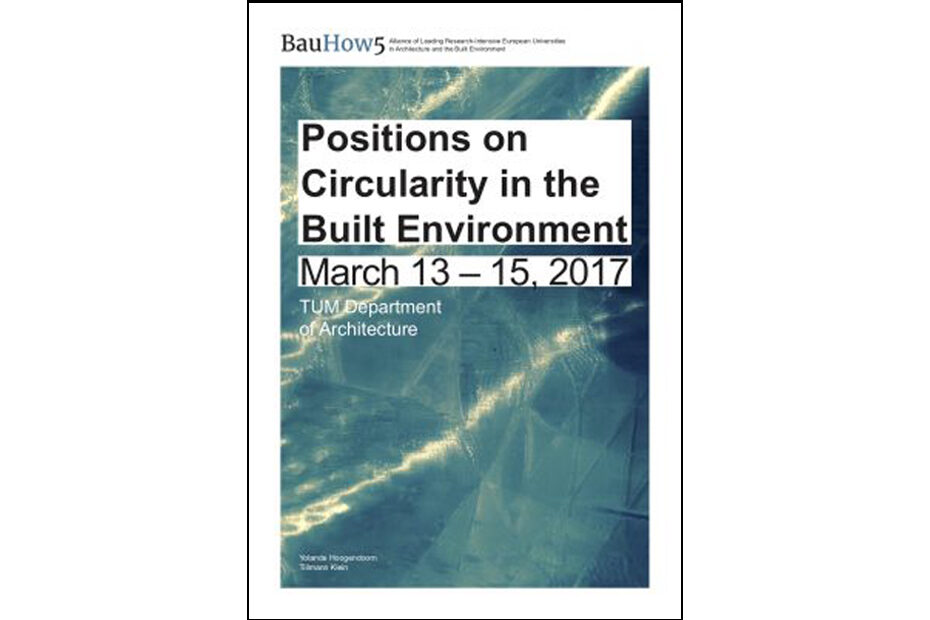Positions on Circularity in the Built Environment
March 13 – 16, 2017. Circularity concerns different scale levels of scale such as urban design, architecture, building technology and building management. Legal, economic, and data management as well as construction issues are of major importance. We observe a strong trend to approach circularity within Europe, while, at the same time, the field is still largely uncharted. The event brought together key expertise across the BauHow5 architecture faculties, TU Delft, UCL Bartlett, Chalmers, TU Munich and ETH Zürich, aiming at answering the following questions: Who is working in the area? Is there a common understanding about circularity? What are the national and international funding possibilities, and how can the cooperation of the BauHow5 universities be stimulated? A three-day program was designed. The first day was open to the public and featured position lectures of professors of BauHow5. Room was given for interaction with the visitors. On the second day, 16 doctoral candidates presented their work, and the event was concluded with a group working session on day three. Here an approach was made to come to a common definition of Circularity in the Built Environment and further steps for cooperation were defined.
Organization: Prof. Dr. Tillmann Klein, Yolande Hoogendoorn
Speakers:
Session 1- Urban Level
Ellen van Bueren, TU Delft – Perceived opportunities and risks of resource exchange projects
Mark Michaeli, TU Munich – Challenges in urban transformation
Bob Geldermans, AMS/TU Delft – Circular cities, context and time
Ben Croxford, UC London – Circular Economy Lab (CircEL)
Session 2 – Building Level
Krystyna Pietrzyk, Chalmers – Circularity aspects of building design – accounting for uncertainties
Werner Lang, TU Munich – Circularity: The key for building with a positive footprint
Liane Thuvander, Chalmers – Multi-scale urban transformation with multi-stakeholder involvement
Session 3 – Component Level
Tillmann Klein, TU Delft/ TU Munich – Towards circular building construction
Klaus Peter Sedlbauer, TU Munich / Fraunhofer IBP – Disruptive changes in construction
Matthijs Prins, TU Delft – Circular economy – Models, tools and rules
PhD Sessions on Circularity in the Built Environment
Session 1 – Urban Level
Martin Heissler, TUM – Low Temperature district heating networks – the potentials of heat exchange
Marco Adelfio, Chalmers – Data management challenges in the analysis of compact city processes
Estefania Tapias, ETH – Climate-sensitive urban adaptation: Outdoor thermal comfort in Barranquilla, Colombia
Ata Chokchachian, TUM – Climatic parametric tool for early stages of urban design
Anna Kaczorowska, Chalmers – Rethinking Cities, transition towards resilience and bio-based urban strategies
Session 2 – Building Level
Patricia Schneider, TUM – Embedded (“grey”) energy in buildings
Miguel Casas Arredondo, UCL – Office refits and defits and the circular economy
Anna Bride Eriksson, Chalmers – Residential circularity, spatial use and the reoccurring shift of households
Matthias Heinrich, TUM – Identifying and Influencing construction induced material flows in urban areas
Colin Rose, UCL – An urban triage for existing construction components entering the waste stream
Session 3 – Component Level
Anne van Stijn, TU Delft – Circular components in the built environment
Simone Salfner, TUM – Building transformation through a holistic design approach
Jayathissa Prageeth , ETH – Assessment of adaptive photovoltaic envelops
Juan Azcarate, TU Delft – Business models for building envelopes in a circular economy
Rosina Rieder, TUM – Criticality of raw materials and its impact on developments of building technologies
Maxim Amasov, TU Delft –
